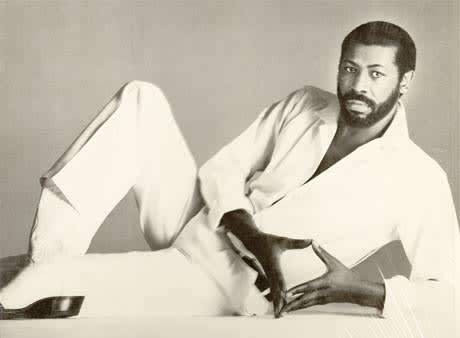Teddy Pendergrass, one of the last soul singers of his kind, has died of colon cancer at the age of 59. Possessed of a super-manly baritone, "impassioned" is too tame a word to describe his vocal delivery. Known as the "Teddy Bear," he was able to frame a gritty voice within smooth phrasing that made him irresistible to many.
Pendergrass died Wednesday (January 13) in Philadelphia, where he had been in hospital for months. The singer's son told the Associated Press that his father underwent colon cancer surgery eight months earlier and had a "difficult recovery."
Pendergrass was the brightest solo star of Kenny Gamble and Leon Huff's Philadelphia International label during its '70s heyday, bringing symphonic soul to its highest heights then moving to earthier and more electronic sounds as times changed. A native Philadelphian, Pendergrass started with Harold Melvin and the Blue Notes as a drummer in 1969. He graduated to lead singer by the following year, and Gamble and Huff made the group one of their new label's initial signings in the early '70s. They had success immediately with eternal ballads "I Miss You" and "If You Don't Know Me By Now," and a sex symbol was born. The Blue Notes' greatest success came with uptempo dance numbers thay presaged disco, such as "The Love I Lost" and "Bad Luck."
By 1977, Pendergrass struck out on his own and recorded three million-selling albums produced by Gamble and Huff and their various protégés (including McFadden and Whitehead). During the late '70s, Pendergrass was known for his infamous "For Women Only Concerts," which, according to anthology liner-note writer David Nathan, "everything you heard was true: young, middle-aged and if-their-husbands-knew-they'd-be-in-big-trouble older women were crowding the stage, throwing phone numbers and occasionally panties at him."
Moving into the '80s, Pendergrass refined his sound to include funky slow jams like "Love TKO" and "quiet storm" classics like "Turn Out the Lights."
In 1982, he was involved in a major car accident that left him paralyzed from the waist down, but he continued to make music. He scored again in 1985 with Workin It Back, which went gold, and played Live Aid the same year. He formed Teddy Bear productions to further branch out his musical visions.
Pendergrass continued to experience health problems but rebounded once again to score a No. 1 R&B single in 1991: "It Should Have Been You." He toured with the musical Your Arms Too Short to Box with God in 1996 and wrote an autobiography in 1998.
In 2006, Pendergrass announced his retirement, though he performed one more concert for charity the following year. Last year, he had a medical procedure to address his cancer, but in the end he lost the fight.
Pendergrass died Wednesday (January 13) in Philadelphia, where he had been in hospital for months. The singer's son told the Associated Press that his father underwent colon cancer surgery eight months earlier and had a "difficult recovery."
Pendergrass was the brightest solo star of Kenny Gamble and Leon Huff's Philadelphia International label during its '70s heyday, bringing symphonic soul to its highest heights then moving to earthier and more electronic sounds as times changed. A native Philadelphian, Pendergrass started with Harold Melvin and the Blue Notes as a drummer in 1969. He graduated to lead singer by the following year, and Gamble and Huff made the group one of their new label's initial signings in the early '70s. They had success immediately with eternal ballads "I Miss You" and "If You Don't Know Me By Now," and a sex symbol was born. The Blue Notes' greatest success came with uptempo dance numbers thay presaged disco, such as "The Love I Lost" and "Bad Luck."
By 1977, Pendergrass struck out on his own and recorded three million-selling albums produced by Gamble and Huff and their various protégés (including McFadden and Whitehead). During the late '70s, Pendergrass was known for his infamous "For Women Only Concerts," which, according to anthology liner-note writer David Nathan, "everything you heard was true: young, middle-aged and if-their-husbands-knew-they'd-be-in-big-trouble older women were crowding the stage, throwing phone numbers and occasionally panties at him."
Moving into the '80s, Pendergrass refined his sound to include funky slow jams like "Love TKO" and "quiet storm" classics like "Turn Out the Lights."
In 1982, he was involved in a major car accident that left him paralyzed from the waist down, but he continued to make music. He scored again in 1985 with Workin It Back, which went gold, and played Live Aid the same year. He formed Teddy Bear productions to further branch out his musical visions.
Pendergrass continued to experience health problems but rebounded once again to score a No. 1 R&B single in 1991: "It Should Have Been You." He toured with the musical Your Arms Too Short to Box with God in 1996 and wrote an autobiography in 1998.
In 2006, Pendergrass announced his retirement, though he performed one more concert for charity the following year. Last year, he had a medical procedure to address his cancer, but in the end he lost the fight.
